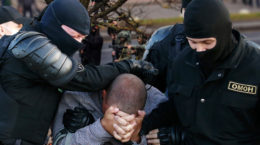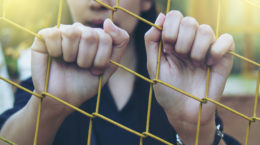Human rights centre Our House is hereby presenting a monitoring report on repressions against toys and puppets in Belarus. As it turned out, they also know how to protest or, as the Belarusian regime understands it, express Western values. Belarusian activists used toys and puppets during protests in order to creatively express their views and their civic stance in a manner that would help to avoid repressions against relatives, additional arrests or persecution.
We have hereby collected several most famous cases.
The history of the severe fight that the Belarusian regime has been conducting with toys and dolls has been going on for at least 12 years now, and it involves absolutely all uniformed agencies of Belarus, from the KGB to the State Control Committee.
Toy protest meeting
On February 10, 2012, activists of Zmena youth wing of the Tell the Truth campaign conducted a protest performance in the Independence Square in Minsk called “Toys’ rally”. Toys were sitting on a flowerbed holding political slogans. The action took place in front of the entrance to the Minsk City Executive Committee. All the toys were detained by a police squad and taken to an unknown location.
On February 22, 2012, Moskovsky District Court of Minsk sentenced the leader of the youth wing of the Tell the Truth campaign, Pavel Vinahradau (who is currently still a political prisoner) to 10 days of administrative arrest for the protest rally with use of toys, held on February 10, actually just because Pavel had put the toys with posters on the flowerbed.
The judge Tatsiana Matyl, who was trying the case, found Pavel Vinahradau guilty of organizing the action “Toys’ rally” held near the building of the Minsk City Executive Committee. The activist was accused under Art. 23.34 of the Administrative Offences Code – violation of the order of organization or execution of mass gathering events.
Pavel Vinahradau was not the only one punished for the non-sanctioned rally. His associate, Aliaksandr Artsybashau, was arrested right in the courthouse. People who arrested him said: “Maybe, you would like to help Pavel and buy something for him to take to prison?” As soon as he walked out of the door, he was arrested. That is, during the trial over one activist, the second one got arrested for the action he did not participate in. Since Pavel’s arrest had been a spontaneous one, he did not have any personal items to use, like a toothbrush, tooth paste, toilet paper, etc., during his administrative arrest. So, Aliaksandr Artsybashau offered to buy the necessary hygiene items for Pavel, and was detained, too.
On February 23, 2012, at Minsk square near the house-museum of the First Congress of the RSDLP, not far from Victory Square, another similar rally of toys holding political posters in their hands took place.
On February 27, 2012, the action “Toys’ rally” took place in Zaslavl (Minsk region). Activists of Zmena youth wing of the Tell the Truth civil campaign organized another “toys’ picket” around 2:00 p.m., this time next to Zaslavl City Executive Committee. A teddy bear, a leveret, a duckling and two plastic dolls “demanded” to release all their “plush allies in the struggle” that had been detained earlier, and also to release Pavel Vinahradau and Aliaksandr Artsybashau, that were serving their 10-days administrative arrest for organizing the first plush picket near the Minsk City Executive Committee on February, 10.
“Teddy Bear Airdrop”
On July 4, 2012, information appeared about incursion of a Swedish light-engine aircraft into the Belarusian airspace. Its pilots dropped over Minsk and Minsk region 876 plush teddy bears with leaflets tied to them appealing to ensure the freedom of the press in Belarus.
Swedish amateur pilots published videos and photos of the light-engine aircraft that had disseminated teddy bears over Minsk, and said that on July, 4, they crossed the Belarusian-Lithuanian border unimpededly and flew over the territory of Belarus for four hours. Information about the unsanctioned flight appeared on the day following the day of the parade of the troops in Minsk in honor of the Independence Day, on which the Commander-in-Chief of the Armed Forces of the country and self-proclaimed president Aliaksandr Lukashenka declared about “bringing the army in line with the new challenges and threats of the 21st century”.
The author of the action, the head of the Swedish company Studio Total, Per Cromwell, in his open letter addressed to Lukashenka communicated that the pilots encountered no obstacles while penetrating the territory of Belarus: they had found the information about the air-defense units of the country on the Internet.
On July 5, 2021, the press service of the Ministry of Defense of Belarus informed that nothing had happened: “There are no facts confirming any crossing of the state border of the Republic of Belarus in its airspace. Examining the presented photo and video materials, the experts detected rough work with elements of visual falsification which is evidence of obviously provocative character of the supplied information. In the course of the previous day, air-defense forces on duty guided over 1000 aircrafts. The air traffic control bodies carry out continuous monitoring of the airspace of the Republic of Belarus”.
On July 7, 2012, a realter was detained, 26-year-old Siarhei Basharymau, who rented an apartment to Per Cromwell, the organizer of the “Teddy Bear Airdrop” action. Per was guarding and filming the teddy bears’ landing from the ground.
On July 13, 2012, the KGB of Belarus detained a 20-year-old student of the Institute of Journalism, Anton Suriapin, who had been the first to post photos with protesting teddy bears falling from the sky on his website. His interrogation led the KGB to his “accomplice”, a 16-year-old school-girl from the village of Ivenets near Minsk, Katsiaryna Skuratava. It was above her village that the Swedish pilots disseminated teddy bears.
The girl was dreaming about entering the faculty of journalism, and her very first photo report she sent to her friend, Anton Suriapin, turned out to be an information bomb. She was interrogated by the KGB in the presence of her parents, and released. Also, the girlfriend of the realtor Basharymau was detained and spent 24 hours in the KGB detention center.
All the detentions on that high-profile case were held in an atmosphere of complete secrecy. Parents of Anton Suriapin did not tell the surname of his lawyer to the journalists, and the lawyer, in his turn, refused to inform the parents that a criminal case was open against their son. Nevertheless, Anton Suriapin was moved to the KGB pre-trial detention facility and placed charges against:
On July 7, 2012, Siarhei Basharymau was detained and put to custody, and on July 13, 2012 – the photographer Anton Suriapin. Correspondingly, on July 17 and 23, they were charged under Part 3 Art. 371 of the Criminal Code of the Republic of Belarus “Illegal crossing of the state border of the Republic of Belarus”, although none of them crossed the border of Belarus, as at the time they were inside the country.
Anton Suriapin and Siarhei Basharymau were released under a written pledge not to leave country on August 17, 2012, and the case against them was dismissed on June 28, 2013.
On July 13, 2012, publications started to appear which were criticizing the air-defense system of Belarus and the situation in the Belarusian army in general. The authors noted that over several weeks, the officials denied the fact of intrusion of an aircraft into the territory of the country. Even before the check was completed, the Ministry of Defense of Belarus called the Swedish video materials a “montage” and asserted that there were no facts confirming a crossing of the airspace of the country. Meanwhile, independent experts stated that they considered such a flight totally possible and started talking about serious problems not only in the air-defense forces, but also in the whole Belarusian army.
On July 26, 2012, over three weeks after the incident, Aliaksandr Lukashenka who was also the Commander-in-Chief of the Belarusian army, acknowledged the fact of the unimpeded passage of the air border of the country by a Swedish light-engine aircraft.
“How do you explain the provocation with the airplane that not only crossed our borders, but entered the territory of Belarus unpunished?”, said the leader of Belarus during his meeting with the uniformed agencies on July, 26. “It is the security of our citizens, first of all. Moreover, the aircraft was detected in due time. But why didn’t the commanders stop that flight? Who did they have mercy for?”
On July 31, 2012, it became known that the story of teddy bears dropped from the board of the Swedish civilian aircraft, cost top management of the Belarusian security forces their posts. Aliaksandr Lukashenka relieved the Chairman of the State Border Committee, Maj Gen Igor Rachkovsky, and Air Defense Commander, Maj Gen Dmitry Pakhmelkin, from office for “improper performance of national security duties”.
Besides that, several heads of uniformed agencies were forewarned. In particular, the Minister of Defense, Yuriy Zhadobin, and Chief of the General Staff of the Armed Forces, Petr Tikhonovsky, were forewarned about their incomplete official compliance. Reprimands were issued to Secretary of the Security Council, Leonid Maltsev, and the Head of the State Security Committee, Vadzim Zaitsau.
On August 3, 2012, the Ministry of Foreign Affairs refused to extend the accreditation of the Swedish Ambassador, Stefan Eriksson, which had worked in the country for 7 years. The diplomat was accused of “destroying” bilateral relations, and that it was him and the Swedish Embassy who were behind the “Teddy Bear Airdrop”.
Year 2020 and the Belarusian Zhdun
On November 9, 2020, in Gomel, the court imposed a fine on a mother of many children, Natallia Hlazkova, and her friend, Aksana Likhadzieuskaya, in the sum of 810 BYN ($314) and 637.5 BYN ($247) correspondingly for a photo shoot with the toy Zdun (Idun, Homunculus Loxodontus, “The One Who Waits”).
During the court hearing, Natallia Hlazkova said, that two weeks before that she had been imposed a fine on for a photo with a white-red-white flag. So, she sewed a puppet and decided to sell it in an auction to pay the fine. To submit the lot, Natallia and her friend Aksana decided to make a picture of the doll against the background of nature and with a small white-red-white flag.
The police officer Yauhen Kavaleu said in the report, that Natallia, “in a previously determined place, marked herself with a toy in a red jacket and with a white-red-white flag, thus, conducting a picket without permission of the city executive committee”. The police were summoned to the place of the photo shoot by a Yuliya Ivanchanka. She indicated in her testimony, that was read at the court hearing, that she had noticed two women in the recreation area “Prudy”, who were photographing a “toy that looked like the president”, so she called the police.
The judge Darya Askerko found that by their actions the women “attempted to express their attitude to the events of social and political character without a permission of the city executive committee”.
On December 22, 2020, it became known that Aksana Likhadzieuskaya, a mother of two children form Gomel, one of the creators of the puppet “Belarusian Zhdun”, was fired from her job, taken to a temporary detention facility and forced to leave the country.
“It turned out, we had been followed”, Aksana told the journalists. “We got detained together with that puppet and taken to the police station. I asked them not to put us behind bars, promised to delete the photos, but nonetheless, despite having children, me and my friend were put to the temporary detention facility till the court hearing. Before that, the police told me: “Don’t worry, the trial will be tomorrow: you will be fined in the sum of 25 basic units, and Natallia – 30”. Probably, it’s not surprising that it happened as they had said”.
On December 23, 2020, it became known that the resident of Gomel, the mother of many children from Belarus, Natallia Hlazkova, fined for the puppet that looked like Lukashenka, left Belarus. When she got to safety, the woman told the journalists:
“When they summoned me for an unofficial conversation, they said that a criminal case had been launched against me under Article 189, and that I had better not be in the city, but hide somewhere. So, I hid together with my children. But you understand, it’s difficult to hide with children. They cannot go out; they do not attend school. I go shopping with caution. It’s not life, it’s prison.
So, I made a decision that we could not live like that any longer, and I cannot submit my children to such a violent life. I decided to leave the country. I wrote to the consul, he approved, and I went to Grodno to file the documents. When I came back, the police were waiting for me at the station. They put me in a car, and suddenly my phone rang: my mother was calling. I worried, I thought I should warn her, as she was there alone with the kids. I answered the phone, and a police officer said: “Take her phone from her”. They began wringing my hands to take away the phone.
They took me to a police station, took all my money till the smallest coin out of my purse, and said they confiscated it as fine payment. They seized two phones. When I was asking: “On what basis are you detaining me? Show me some warrants, some papers. Why are there no documents on the things that you seize from me?” They said: “All will be [given], all will be [given]”.
Then, when they came with a search to my home, they showed a prosecutor’s sanction for search, called search witnesses, examined my home. There was a storage room. He said: “Give me the keys for that room”. I answered: “You have no sanction for that”. He said: “If you don’t give them nicely, we’ll take them by force”. Of course, I gave the keys and explained that there weren’t any items there, only potatoes. They indeed found nothing there. Again, they gave me no papers, they seized the computer and another phone. That’s it. They left me at home without any documents. I was worried, yes, so I packed things, and left with my children.”
Hysteria around the Huggy Wuggy toy.
On November 17, 2022, the pro-regime activist Volha Bondarava paid attention on her Telegram channel that a known character of the game Poppy Playtime, Huggy Wuggy, appeared on the New Year’s billboard of Gomel Puppet Theatre and called that “an ideological sabotage against the normal moral and emotional development of Belarusian children”. So, Volha Bondarava turned to the police, to the KGB and to a number of other agencies, and in fact started a war against the toy.
On November 25, 2022, Volha Bondarava informed that the image of Huggy Wuggy was erased from the billboard of the Gomel Puppet Theatre.
On November 30, 2022, publications started appearing on mass media telling that a number of initiative groups of Belarusian residents turned to the State Control Committee with a request to give assessment to the influence that the toy Huggy Wuggy was making on children’s psychological system. Huggy Wuggy is a character in the game “Poppy Playtime” of the year 2021 in the genre that might be translated as survival in a horror/puzzle adventure.
The State Control Committee of Belarus “detected” that the Ministry of Education, the Ministry of Antimonopoly Regulation and Trade and other authorities were receiving multiple appeals from citizens on the issue of protecting children from products and information that can harm their health. The appeals expressed requests to conduct a thorough analysis of the impact that the toy Huggy Wuggy might have on children’s psychological health and forbid to sell it. All the bodies, except for the main control body of the country, did not want to fight with a toy and tried to calm the initiative citizens with some non-committal replies.
Before that, two Russian specialists, a doctor of jurisprudence, Prof. Igor Ponkin, and a doctor of psychology, Prof. Vera Abramenkova, conducted research on Huggy Wuggy, and the results of their expertise were published on October 1, 2022. With reference to that expertise report, the KGB of the Republic of Belarus noted, that the toy “was forming an image of aggression, cruelty, predatory and merciless evil. Since the size of the toy is similar to a height of a teenage child, an effect of “identification with the aggressor” appears while playing with it. That impact is detrimental to a psychological health of a child, it can lead to irreversible consequences, manifest later in unconscionable patterns of aggression, and lead to pathological problems in a child’s life.”
On suggestion of the State Control Committee, the State Committee for Standardization of the Republic of Belarus carried out control activities over seven business entities selling Huggy Wuggy toys. The inspection revealed come violations (absence of mandatory information on packaging and labeling, non-submission of documents confirming conformity of the products) and issued a regulation prohibiting sales of 29 lots (782 items) of goods with Huggy Wuggy theme (toys, bags and caps for children).
On November 30, 2022, the head of the Main Education Department under Grodno City Executive Committee, Ruslan Abramchyk, said on his Telegram channel with a reference to a Russian philosopher, ideologist of Eurasianism and war propagandist, Alexander Dugin:
“It is, in fact, not a toy. Its selling in children’s goods sections is the same as if alcohol, cigarettes drugs and weapons were sold there. … The opposites “Good-Evil”, “friend or foe” in a game are always unambiguous. A wolf is evil, gees are friends. A toy bears some unambiguous characteristics. A kind teddy bear, a courageous soldier, a predatory and dangerous tyrannosaurus. … A double message in a young age causes mental disorders. Children do not understand paradoxes like “come closer from me”, if we use the terms of Aleksandr Gelievich Dugin.
Such toys are seeds of future problems of socializing and trusting people and the world. They have been invented by adults, fed up with adrenaline, for their bone-chilling entertainment. Tomorrow, a new character will appear, and adults will switch to it, as it has already happened with similar fluffy killers from the game Five Nights At Freddy’s. And the potholes in the children’s mental health will stay forever.”
On December 21, 2022, independent mass media informed that the Council of Ministers of Belarus had decided to “exclude propaganda of Western values”, usage of foreign characters like Huggy Wuggy toys and other elements “contradicting traditions of the Belarusian nation” during children’s New Year festivities and other cultural events. Halloween was also banned.
Not long before that, a document from the local district department of education was published on social media of the town of Zhlobin. The letter to heads of educational institutions said that they were obliged to take “exhaustive measures to prevent propaganda of events … contradicting traditional values of the Belarusian people.” Namely, to prevent celebration of Halloween in kindergartens, schools and colleges, and appearance of costumed heroes like “Huggy Wuggy and similar” at New Year festivities and other events.
As it turned out, the issue of defending “traditional values” in kindergartens and schools had been examined by the Ministry of Culture and Administration of Aliaksandr Lukashenka, which passed corresponding decisions. The campaign against “foreign” values was conducted by pro-Russian and pro-regime activists.
The war with kids’ toys in Belarus continues.










